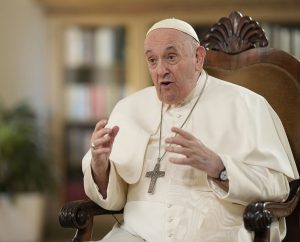Less than a week before Christmas, the Vatican’s Dicastery for the Doctrine of the Faith released a theological declaration approved by the pope allowing Catholic priests to bless same-sex couples.
The document, titled Fiducia supplicans, outlines “the pastoral meaning of blessings” in the Catholic Church. A subsection of the document is titled “Blessings of Couples in Irregular Situations and of Couples of the Same Sex.” According to reporting by Reuters, the document “said priests should decide on a case-by-case basis and ‘should not prevent or prohibit the church’s closeness to people in every situation in which they might seek God’s help through a simple blessing.’”
In other words, while the Catholic Church’s official stance on the sinfulness of same-sex unions and sexual activity remains unchanged, same-sex couples and other people in “irregular situations” now may seek personal, non-liturgical blessings from their priests.

Pope Francis pauses during an interview with The Associated Press at The Vatican, Tuesday, Jan. 24, 2023. (AP Photo/Andrew Medichini)
In October, Pope Francis sparked controversy when he issued a document in response to the queries of five cardinals seeking clarity on the church’s stance on homosexuality in which he stated he was open to unofficial blessings of gay couples: “When you ask for a blessing, you are expressing a request for help from God, a prayer to be able to live better, a trust in a father who can help us live better.”
The Catholic Church’s traditional teaching, he argued, does not mean clergy may “become judges who only deny, reject, exclude.”
Reaction to the Dec. 18 proclamation came swiftly from all sides of the theological spectrum.
James Martin, a Jesuit priest, editor-at-large of America Magazine: The Jesuit Review, and longtime LGBTQ Catholic ally, said in a statement on the site formerly known as Twitter that the Vatican’s declaration is a “major step forward in the church’s ministry to LGBTQ people and recognizes the deep desire in many Catholic same-sex couples for God’s presence in their loving relationships.”
Martin then added a follow-up statement: “Be wary of the ‘Nothing has changed’ response to today’s news. It’s a significant change. In short, yesterday, as a priest, I was forbidden to bless same-sex couples at all. Today, with some limitations, I can.”
Other reactions within the Catholic world have not viewed this development with such rose-colored lenses.
In an interview with Reuters, Ulrich L. Lehner, professor of theology at the University of Notre Dame, said the new doctrinal document “invites misunderstanding and will sow confusion” and said he fears it will be “an invitation to schism.”
If recent history is any measure, Lehner’s insights could prove prescient, especially in the view that these developments from the Vatican have occurred just months after the Church of England, another historic ecclesiastical body and mother church of the nearly 110-million member Anglican Communion, saw its General Synod approve trial use liturgies for the blessings of same-sex couples. Soon thereafter, nearly one dozen Anglican primates, primarily from the African continent, declared they were now in a state of “impaired communion” with the Church of England and the Archbishop of Canterbury.
As of yet, no major ecclesiastical groups have issued similar statements of schism or impaired communion with reference to Pope Francis, although recent events in other churches racked with schism over LGTBQ issues would prove they would not be unprecedented.
This is a breaking news story and will be updated as more information becomes available.


